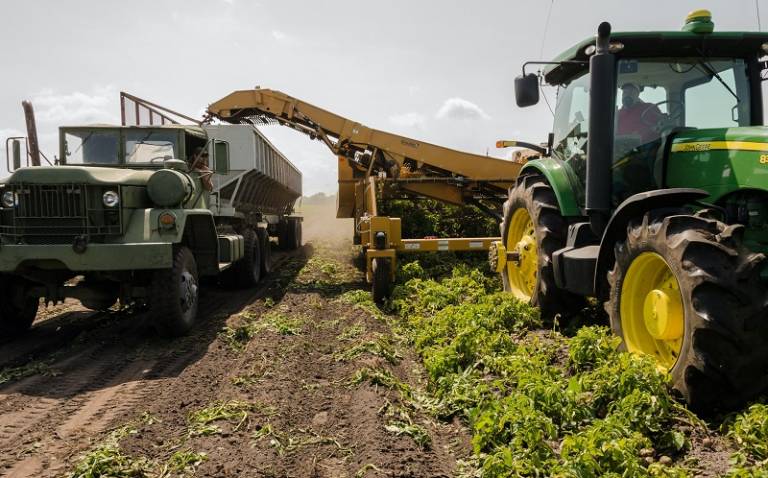Taking action to achieve Net Zero in the agriculture sector
15 April 2021
Farmers need to be prepared to take action now in order to achieve Net Zero in the agriculture sector by 2050, according to UCL researchers.

The report, UK Agriculture: Pathways to Net Zero, commissioned by HSBC, examines the importance of reducing net agriculture emissions of greenhouse gases and how farmers can achieve this through changes to farm management.
The research shows that a long-term focus on sustainability is needed and farmers must have a better understanding of their farm’s performance including greenhouse gas emissions (methane, nitrous oxide and carbon dioxide) and carbon capture accounting.
Lead author Dr Carole Dalin (UCL Bartlett School of Environment, Energy & Resources) said: “We are at a crucial turning-point for agri-food systems worldwide, and the UK has the opportunity to lead in showing how the sector can transform to benefit farmers, consumers and life-supporting ecosystems.
“Appropriately-scaled knowledge and financial support will be key to enabling farmers to successfully transition their activities towards Net Zero, in ways that make their lands and income more resilient and sustainable.”
The agricultural sector is both vulnerable to climate change and a strong lever for mitigation and adaptation. Government, regulators and consumers are increasing demands to implement sustainable practices to reduce emissions. This presents a unique challenge to farmers who need to maintain productivity and profitability from their core activity as food producers whilst also navigating changes in support levels and regulations post Brexit.
The report found that a detailed investment plan is essential if farmers are to secure growth in the future, as well as reaching the government’s Net Zero goals. Some of these changes will have an immediate impact on productivity as well as emissions, while others may take time to pay dividends on farm returns.
Proposed actions should include targeted measures to reduce emissions, capture carbon and the shifting of operations towards renewable energy and bioenergy, including:
- Measures to improve productivity and efficiency - such as more efficient use of fertilisers, improved manure management to reduce nitrogen loss or improvements to livestock and arable production practices
- Appropriate planting of trees, protecting and restoring habitats and soil
- Generating and utilising renewable energy
- Growing appropriate bioenergy crops to increase crop diversity and income
- Developing future technology and becoming leaders on changes to diets and reducing food loss and waste
The report finds that farmers are making progress towards Net Zero, but to achieve this by 2050 there needs to be a coordinated effort from the whole industry, government and financial institutions to make significant changes to the sector.
Martin Hanson, (Head of Agriculture, HSBC UK Commercial Banking), said: “Farmers need to be prepared to make tough investment decisions in the short-term. That will put them in the best position to drive growth sustainably in the future. A ‘wait and see’ approach puts them at risk of being left behind, as the wider food industry changes and higher standards are demanded.”
One of the biggest areas of risk to achieving Net Zero goals is measurement. Farmers need to be able to measure and set baselines for the outputs of their farm, environmental impacts and emissions in order to plan towards Net Zero.
According to the research, choosing a carbon measurement methodology that suits the needs of the farm and instils confidence in the farmer is critical, as investment decisions should be made based on this data. Fully understanding emissions will help to highlight their largest sources and identify what could be done to reduce them.
Martin Hanson continueds: “It’s important that farmers look to invest in the measurement tools they need now so they can build a picture of what they need to do to achieve their sustainability goals in the future.
“It’s also vital to remember that Net Zero should not be seen as an isolated objective. It is one of a number of key milestones along the pathway to making UK agriculture more resilient to environmental challenges now, and in the future.”
HSBC UK recently launched a £1.2bn fund for the agriculture sector as part of it’s nationwide SME Fund to support businesses as they bounce back from the pandemic.
Links
- Research paper UK Agriculture: Pathways to Net Zero, commissioned by HSBC
- Dr Carole Dalin’s academic profile
- Bartlett Institute of Sustainable Resources, UCL
- Bartlett School of Environment, Energy & Resources, UCL
- The Bartlett, Faculty of the Built Environment, UCL
- HSBC Centre of Sustainable Finance
Image
Source
Media contact
Kate Corry
Tel: +44 (0)20 3108 6995
Email: k.corry [at] ucl.ac.uk
 Close
Close

